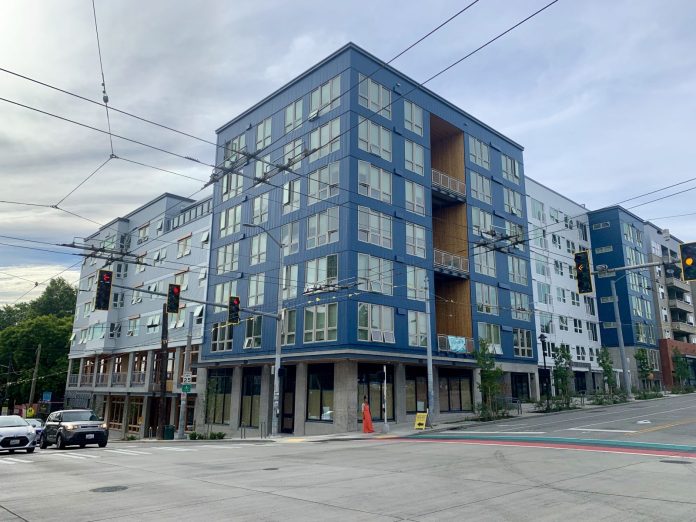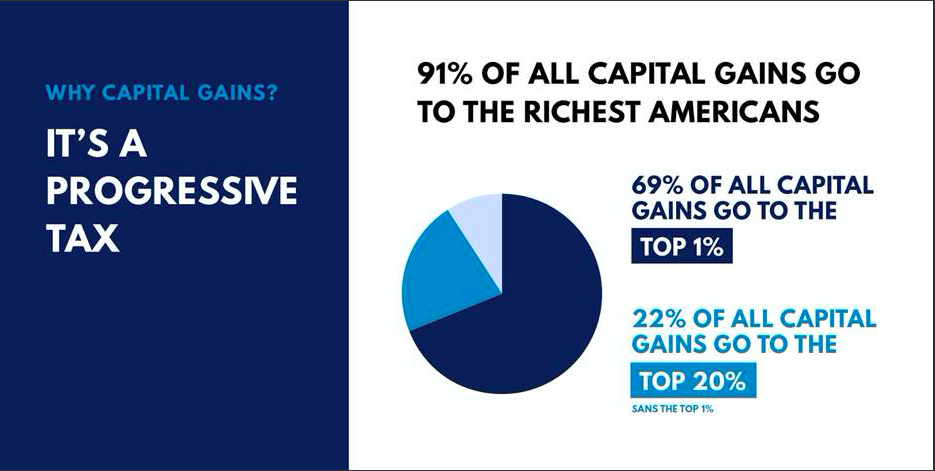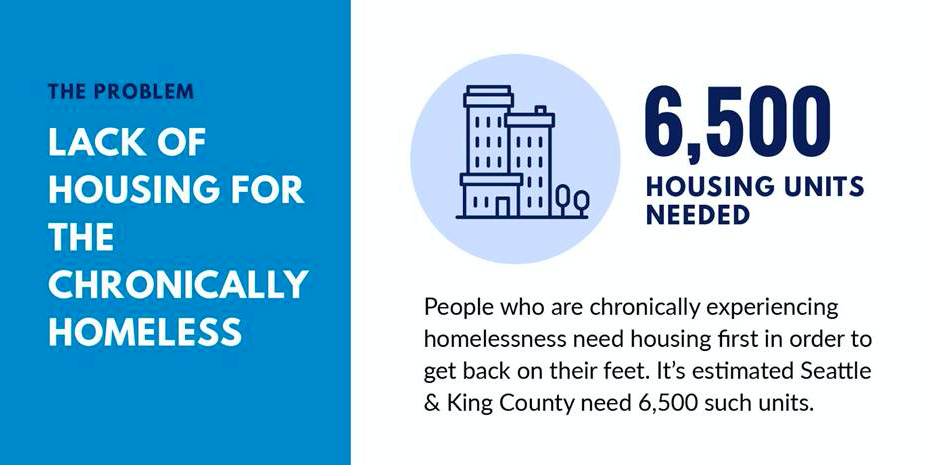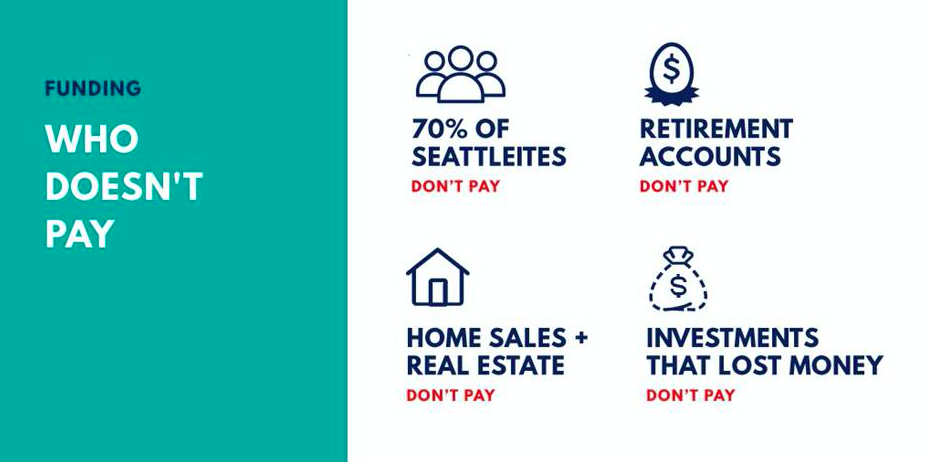
Proposed by Councilmember Andrew Lewis, the new tax would fund housing and homeless services
With the Covid recession already putting local governments’ budgets into the red, the race is on for lawmakers to devise new measures to increase revenue. Ensuring new revenue is raised through progressive rather regressive means is a top priority for some Seattle lawmakers, given Washington State’s history of regressive taxation and the new challenges presented to low-income Seattleites by the Covid pandemic.
Seattle already has two payroll tax proposals that target big businesses up for discussion, the $500 million “Amazon Tax” sponsored by Councilmembers Kshama Sawant and Tammy Morales, and the $200 million “JumpStart Seattle” plan put forth recently by Councilmember Teresa Mosqueda. Now Councilmember Andrew Lewis has introduced a third measure into the mix, a 1% capital gains tax on stocks and bonds when sold for profit that Council Central Staff estimate could raise roughly $37 million per year.

That lower revenue figure could be a point of concern for some, especially as Mosqueda’s lower revenue earning payroll tax appears to be gaining traction over the Sawant-Morales proposal. At a moment when budget projections are growing more dire and needs are increasing, few progressives would be happy with a situation in which new revenue generating plans are seen as racing to the bottom in order to become more palatable to the political and business establishment. Yet because Lewis’s plan offers up a different means of taxation, it’s possible that it could be passed alongside one of the payroll tax measures. Additionally, the fact that the tax’s proceeds would be earmarked specifically for permanent supportive housing and homeless services could bolster support.
“We know the solution to meet the scale of our homelessness and affordable housing crisis—it’s providing more housing. Specifically, we need to invest in permanent supportive housing with wraparound services, so our homeless neighbors can stabilize, create community, and ultimately heal,” Lewis said in a press release. “I joined the Third Door Coalition, which estimates our region will need $1.6 billion over the next five years to build 6,500 units to make an impact on our homelessness crisis. Our nonprofit and private sectors cannot go it alone. Our government must raise progressive revenue in order to adequately address this crisis.”
While permanent supportive housing, which pairs housing with case management and supportive services, has been shown to be highly effective in transforming people’s lives, it is more expensive to operate than traditional affordable housing, underscoring the need to have adequate revenue to cover its ongoing costs.

Why push for a capital gains tax now?
Enacting a capital gains tax on the state level has been a hot topic for some time. With Democratic majorities in both the State House and Senate, last year’s failure to pass a 9% statewide capital gains tax was a real sore spot for political leaders like Governor Jay Inslee.
However, a lot has occurred since that proposal fizzled out. Last July, a ruling by a State Court of Appeals opened the door for cities to be able to tax income, leading to the City of Seattle to push to reinstate a 2.25% tax on high-earning households which was passed by the City Council in 2017. Unfortunately, the Supreme Court of Washington declined to hear the City’s petition on what was nicknamed Seattle’s “wealth tax” this past April in what was seen as a major blow for state tax reform advocates.
But another interesting development about the tangled web that is Washington State tax law emerged from the Washington Supreme Court’s decision, the reaffirmation that income is property, and thus can be taxed. However, because property must be taxed uniformly in Washington State, this meant Seattle’s proposed tax on high earners, which was graduated, was invalid, but it also meant that cities had the right leverage a flat income tax of 1% or less in keeping with state property tax law.
Because a flat income tax could be seen as regressive, lawmakers were left in a bind–one that Lewis has sought to escape by applying the tax only to capital gains.

Under Lewis’s proposal, retirement accounts, investments that have lost money, and real estate sales would all be exempt. That last provision concerning real estate sales is a bit of a kicker for some tax reform advocates since the inclusion of real estate sales would have greatly increased the revenue earning potential of the tax.
The choice to leave real estate out occurred because including it because was seen as
potentially too controversial; however, according to reporting by Nathalie Graham at The Stranger, that decision might present its own complications. In her article, John Burbank, the executive director at the Economic Opportunity Institute, which supported Seattle’s wealth tax, was quoted as saying “the exclusion of real estate may also create a legal challenge because according to the constitution, a tax must be uniform across a class.” It is hard to imagine how a real estate exclusion would stand up among other forms of income.
Lewis has shared that he fully anticipates that the measure will confront a legal challenge if adopted by the City. However, hope remains that the lawsuit could result in another chink in the gold plated legal armor that has prevented income from being taxed in Washington State since the 1930s.
And if the tax does pass, Lewis said he will be happy to pay it. “If I’m fortunate enough to make $500 on the stock market this year, the least I can do is give $5 to the City to house and support people. I wish it could be more.”
With evidence showing that a great deal more than $37 million per year needs to be invested in solving Seattle’s affordable housing and homelessness crises, let’s hope legislators in Seattle and beyond continue to push for more progressive tax measures to fund these important investments.
Natalie Bicknell Argerious (she/her) is a reporter and podcast host at The Urbanist. She previously served as managing editor. A passionate urban explorer since childhood, she loves learning how to make cities more inclusive, vibrant, and environmentally resilient. You can often find her wandering around Seattle's Central District and Capitol Hill with her dogs and cat. Email her at natalie [at] theurbanist [dot] org.


